Magatte Wade, entrepreneur, author and advocate for African dignity and prosperity through business growth, will deliver the Ralph J. Gerson Distinguished Lecture at 7 p.m. Nov. 10. The discussion will be broadcast via Zoom. (Register here to join the event).
Wade’s talk, “The Heart of the Cheetah: Entrepreneurship and Prosperity in Africa,” will focus on the power of business growth and importance of business-friendly infrastructure, which she sees as critical to innovation and economic flourishing on the continent. As an entrepreneur from Senegal, Wade has decried a lack of business infrastructure and subsequent unemployment as key reasons why many Africans risk their lives to migrate to other countries.
The Ralph J. Gerson Distinguished Lecture gathers the community around the William Davidson Institute at the University of Michigan to celebrate and promote ways businesses can positively impact social challenges. Its transformative speakers bring unique perspectives on economic development, new considerations around innovative business models and informed evaluations of emerging markets.
Wade joins the series’ two past lecturers — Nobel Prize-winning Economist Sir Angus Deaton and Kevin Lobo, Chairman and CEO of Stryker Corp. — in her work highlighting economic acceleration through business tools.
“Magatte Wade is an outspoken advocate for the benefits that profitable businesses bring to an economy,” said WDI President Paul Clyde. “She is a successful entrepreneur who understands the value and importance of business in the development of an economy. Considering WDI’s mission of equipping economic decision makers in emerging countries with the tools of commercial success, it’s hard to think of a stronger advocate with a more relevant background than Wade.”
Wade was named one of Forbes’ “20 Youngest Power Women in Africa,” a Young Global Leader by the World Economic Forum at Davos, and a “Leading Woman in Wellness” award-winner with the Global Wellness Summit. She’s the Director of the Atlas Network’s Center for Africa Prosperity, a member of the Board of Directors of Conscious Capitalism Inc., and a member of the Advisory Board of the Whole Planet Foundation with Whole Foods Market.
As a TED Global Africa Fellow, her TED Talk, titled “Why it’s so hard to start a business in Africa — and how to change it,” has nearly 650,000 views. In her talk, Wade draws a clear and definitive thread between poverty reduction and business creation — asserting that the solution to poverty is making it easier for small businesses to start, run and thrive. In it, she describes how she came to this conclusion: “I have this attitude in life. Something is wrong, find a way to fix it. That’s why I start the businesses that I start, usually consumer brands, that have embedded in them the very best of my African culture.”
Wade describes what it’s like for her to run these businesses in Senegal, navigating the complicated and problematic laws and processes. “It’s like swimming through molasses,” she said. Knowing the impact these stifling rules have on business growth, Wade advocates for easing these restrictions and creating systems that promote private economic development. Not only does changing these laws make a major difference in business success, she explained, but shining a light on them can shift the outlook Africans have about their own capabilities and potential.
Her new book, “The Heart of the Cheetah,” will be released soon.
Register to watch Wade’s speech live on Zoom at 7 p.m. Nov. 10.
Register Now
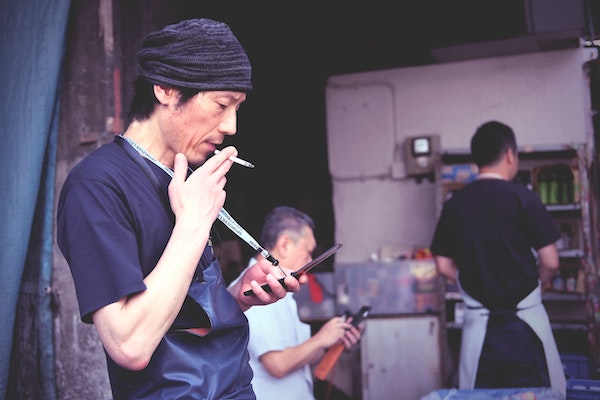
Photo by Erica Leong on Unsplash
Government health ministries in low- and middle-income countries (LMICs) have historically struggled to adequately fund healthcare services for their citizens. But as these countries transition away from donor funding over the next two decades, many will need to find new domestic revenue streams to finance these services. A new WDI white paper explores the impact of raising additional government revenue through increased tax rates on “bads,” such as tobacco, alcohol and sugary drinks.
The paper, “Revenue Estimates from Taxing ‘Bads’ in 16 Low- and Middle-Income Countries,” estimates the additional revenue generated in 2016 had higher excise tax rates been imposed on tobacco, alcohol and sugary drinks and then compares this revenue to select national economic indicators. The analysis included 16 low- and middle-income countries: Côte d’Ivoire, Democratic Republic of the Congo, Ethiopia, Haiti, India, Lao People’s Democratic Republic, Moldova, Myanmar, Niger, Papua New Guinea, Rwanda, Senegal, Sierra Leone, Tajikistan, Tanzania and Togo.
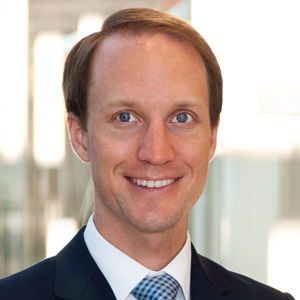
Ben Davis
“The key finding is that increased excise tax rates that result in only a modest increase in retail price can still generate an important amount of additional revenue relative to current health expenditure,” said Ben Davis, a research manager with WDI’s Healthcare sector. Davis wrote the paper with Pascale Leroueil, vice president of WDI’s Healthcare sector, and William Savedoff, senior fellow at the Center for Global Development.
The simulations showed that in 14 of the 16 countries, a tax increasing retail price by 17% could generate additional revenue that is more than 50% of the amount these governments currently spend from their own budgets on healthcare. For 7 of the 16 countries, additional revenue is more than 100% of that amount.
Davis emphasized that the study has limitations. For example, estimates do not account for income and cross-substitution effects (or when consumers switch to cheaper alternatives when a product’s price rises), and they are not adjusted based on historical experience in raising tax revenues.
While the results of the current study are broadly aligned with those recently produced by the Bloomberg Philanthropies’ Task Force on Fiscal Policy for Health, there is a slight difference in methodology. The method used by Davis and his fellow authors allowed them to incorporate several different data sources and calculation methods in the final revenue estimates. Input data were obtained from public databases, journal articles, and LMIC government websites and then used in either a “bottom up” or a “top down” calculation. The “Bottom up” calculation begins with data showing how often individuals consume tobacco, alcohol and sugary drinks while the “top down” calculation begins with the amount of money actually collected by LMIC governments that taxed these products.
Davis said these estimates could act as a starting point for a discussion between global donor organizations and country governments. “A government stakeholder might say, ‘These results are interesting. An increased excise tax on these products might be worth considering. Let’s do a deeper analysis to make sure these numbers reflect reality when we take into account all of the factors that couldn’t be captured in the initial study.’”
“This paper is a small part of a larger conversation about domestic revenue mobilization and healthcare financing in low- and middle-income countries,” Davis said. “It is a building block.”
This white paper is a modest contribution to the existing body of knowledge on potential revenue benefits from taxation of “bads” in low- and middle-income countries (LMICs). We seek to provide orders-of-magnitude responses to the questions, “For 16 LMICs, what amount of additional government revenue could have been generated in 2016 if higher excise tax rates had been imposed on tobacco, alcohol, and sugar-sweetened beverages?”, and “How does this additional government revenue compare to select national economic indicators?”.
WDI extensively reviewed literature, conducted interviews with in-country stakeholders and consulted with cross-sector supply chain experts to develop a report that provided recommendations for strengthening Senegal’s health supply chain, specifically in regard to last-mile delivery. WDI also delivered recommendations for better incorporating service to the last mile in the national health supply chain strategy. Senegal faces several challenges to ensuring that existing health supply chain continues to expand its reach, product range and quality of service. Several initiatives to improve the function and reach of the health supply chain have been implemented over the previous decade, including the “Informed Push Model,” which has achieved notable success at increasing product availability at the “last mile.”
The Africa Institute of Management (IAM) in Senegal has a number of family-run companies that have asked for help with succession planning – transitioning the ownership and operation of a business from one generation to another. MADE is developing a program that includes a survey to assess the company’s current state in terms of transition readiness, mentorship options, access to IAM courses to shore up skills and technical support.
WDI conducted market research for a company that designs and manufactures unmanned aerial vehicles (UAV) to transport small goods. Use of UAVs to transport items in low- and middle-income countries is low but they show significant potential for making healthcare commodities available in settings with poor infrastructure challenges. The purpose of WDI’s market research was to identify opportunities for this company’s expansion into both healthcare and non-healthcare sectors in Kenya, the Philippines, Zambia and non-healthcare sectors in Senegal. Data had been collected from decision-makers in public and private organizations in each country covering several topics such as product use cases, current transport activities and factors influencing the purchase or lease decision. Data was then analyzed and summarized into a go-to-market strategy for this UAV company in these four countries. This project was funded by the Bill & Melinda Gates Foundation.
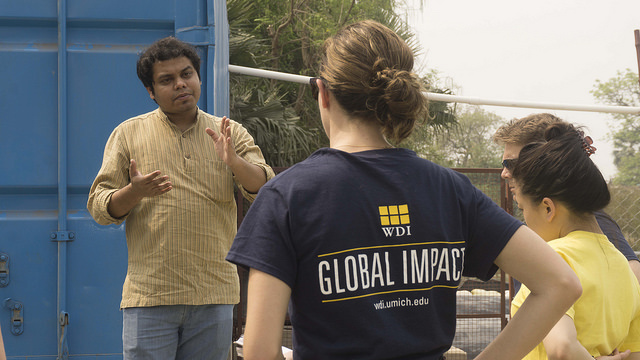
From a 2017 WDI-sponsored MAP team.
WDI’s partnership with Aravind Eye Care System dates back to 1999. Over the years, the organization has utilized a combination of student MBA teams and other engagements with the Institute to explore new ideas for growing strategically and improving operations at its hospitals and clinics, which offer world-class eye care at affordable prices.
Just a few of those completed projects include determining the appropriate governance structures for Aravind, consulting on expanding geographically and growing eye care services, implementing improved operational processes, delivering HR capabilities and leadership training for physicians, and improving the culture and patient experiences. Each of those projects were sponsored by WDI as part of the Ross School of Business’s annual Multidisciplinary Action Projects (MAP).
In 2016, a student team customized and tested an existing process model at select Aravind facilities that measured performance of each unit in terms that everyone in the organization could understand. Last year, the Aravind MAP team worked with senior leadership to develop a roadmap for the eyecare system’s future growth.
MAP is an action-based learning course offered at Ross in which MBA students receive guidance from faculty advisors. Each project requires analytical rigor, critical thinking, and teamwork. (Find out more about WDI’s MAP projects over the years here.)
After learning about their projects and conducting secondary research for several weeks, the students spend two to four weeks working with their organizations in the field.
In March, a MAP team (one of nine sponsored by WDI) will travel to Chennai, India to work at Aravind’s largest facility, which opened in September 2017 and offers the usual suite of services to patients, including specialty eye surgeries. As the new facility nears its six-month anniversary, administrators are studying patient care and looking for areas of improvement.
The students, as part of their overall work to enhance the patient experience, will work with Aravind leadership to develop recommendations on how to transition some of the work performed by eye specialists to general ophthalmologists, who are currently underutilized. Before heading to Chennai on March 17, the team will meet with faculty at the University of Michigan’s Kellogg Eye Center to hear how they manage similar issues.
Members of the MAP team said they are eager to observe the Aravind business model, which student Gerard Heath called “a leader around the world in developing solutions to provide high quality care in low-resource environments.” They all think the experience and work at Aravind will help them in the classroom as they finish up their studies, and may help inform their future career paths.
Kelsey Wyatt-Mair said she is interested in operations and “learning from this hands-on experience will equip me for later in my career, whether it’s in or out of healthcare.”
And Katie Zurales is “excited to see a different healthcare system” and how high quality, cost-effective healthcare “translates to different cultures.”
Of the four team members, which also includes Daniel Semaan, only Wyatt-Mair has some international work experience.
“It will be interesting for all of us – how to navigate that culture,” Wyatt-Mair said. “We’ll get exposed to the similarities and differences of Aravind with, say, Kellogg Eye Center.”
In between the work, the group plans to explore some local temples and beaches and perhaps travel to other cities. They said they were excited to discover Chennai was listed as one of the world’s best “food cities.”
WDI Initiatives often recruit partner organizations to work with MAP teams. The Aravind project is aligned with the Institute’s Healthcare Initiative. Similarly, WDI’s Education Initiative is working with the MAP team assigned to the Technological Institute of the Philippines (TIP) project. The students will create a strategic plan for a newer TIP initiative to improve the engineering and technology skills of students.
Amy Gillett, vice president of WDI’s Education Initiative, said MAP teams are one of the ways the initiative can improve the delivery of management education in emerging markets.
“The MAP teams bring new perspectives to universities in emerging markets,” she said. “They help university leadership think in different ways about how to expand into promising new areas or how to think strategically about growing an existing department or initiative. We’re so pleased to have this opportunity to unite MBA students – with their passion for social impact and their strategic thinking – with our university partners who welcome fresh insights.”
Like many of the Institute’s MAP partners, TIP has collaborated with WDI in the past. TIP was one of three university partners that worked with WDI on the STRIDE project.
“We’re so pleased to continue our successful partnership with TIP,” Gillett said. “During a recent trip to Manila, I had the opportunity to meet with TIP’s leadership. I was really impressed by their commitment to providing access to a college education for underserved communities as well as by their drive to continuously improve their operations and the services they offer to students.”
Here is a summary of each WDI-sponsored MAP project:
Aparajitha Foundations – India
Advisors: Paul Clyde, WDI and Ross School of Business; Stewart Thornhill, Zell Lurie Institute for Entrepreneurial Studies and Ross School of Business
MAP Team: Amirah Patterson, Riki Smolen, Robert Mack, Nathan Stevens
Aparajitha Foundations is a charitable trust that supports the less privileged, mainly in the areas of education and health.
The team will co-create alongside the founding team of the Michigan Academy for the Development of Entrepreneurs (MADE) as they test, validate, and iterate on MADE’s business model and product prototype for supporting entrepreneurs and Small Medium Enterprises (SMEs) in Madurai, India. MADE is a nonprofit institute established at the Ross School of Business by the Zell Lurie Institute for Entrepreneurial Studies, in partnership with WDI and Aparajitha Foundations, that works with entrepreneurship development organizations in developing countries to give individuals operating businesses in these environments the knowledge and best practices they need to thrive.
Aravind Eye Care System – India
Advisors: Paul Clyde, WDI and Ross School of Business; Jim Walsh, Ross School of Business
MAP Team: Gerard Heath, Katie Zurales, Daniel Semaan, Kelsey Wyatt-Mair
Aravind Eye Care System is a vast network of hospitals, clinics, community outreach efforts, factories, and research and training institutes in south India that has treated more than 32 million patients and has performed 4 million surgeries since its 1976 founding.
The MAP team will develop a framework for integrated patient care service delivery.
CURE International – Ethiopia
Advisors: Paul Clyde, WDI and Ross School of Business
MAP Team: Simon Kaufmann, Keegan McQuillan, Alan Wisniewski, Brandon Yelen
CURE operates clubfoot clinics in 17 countries around the world, each tasked with helping children and families deal with the congenital deformity that twists the foot, making it difficult or impossible to walk. In Ethiopia, CURE manages 37 clinics.
The MAP team will work to improve quality and increase scale of leg brace production in Ethiopia.
Ghana Emergency Medicine Collaborative – Ghana
Advisors: David Butz, WDI and Ross School of Business; Jim Walsh, Ross School of Business
MAP Team: Alexander Ukoh, Liam Kraft, Kartik Raju, Shreyance Mandaliya
The Ghana Emergency Medicine Collaborative aims to improve emergency medical care in Ghana through innovative and sustainable training programs for physician, nursing and medical students. The goal of the training programs is to increase the number of qualified emergency health care workers retained over time in areas where they are most needed.
The student team will investigate the feasibility of incorporating mobile payments into the emergency department workflow, including an analysis of how that will impact both the finances and operations of the department.
Imperial Logistics – South Africa
Advisors: David Butz, WDI and Ross School of Business; Ravi Anupindi, Ross School of Business
MAP Team: Justin Loescher, Jasmine Knowles, Courtney Alexander, Javier Castillo
Imperial Logistics provides logistics and supply-chain management across the African continent, and is a leading distributor of medicines and healthcare products.
The MAP team will establish an African Pharmaceutical Wholesaler Association (APWA).
Outbound Initiative – Brazil
Advisors: Paul Clyde, WDI and Ross School of Business; Stewart Thornhill, Zell Lurie Institute for Entrepreneurial Studies and Ross School of Business
MAP Team: Tsering Sherpa, Daniel Vergara Ramirez, Dale Jarosz, Varun Haralalka, Agustin Sosa, Mike Porcelli
Outbound Brasil uses the latest technology to identify global opportunities and resources for the growth of innovative and high impact business in that country, such as new and better markets, customers, partnerships, investments and awards.
The team will conduct a situation analysis on the Brazilian tech investment scenario and make recommendations for which innovations could make smart money more accessible to local startups.
REFRESCH – Gabon
Advisors: Paul Clyde, WDI and Ross School of Business; Bob Dittmar, Ross School of Business
MAP Team: Alena Golovchenko, Felipe Prieto Nunez, Sean Welsh, Allie Murphy
REFRESCH (Researching Fresh Solutions to the Energy/Water/Food Challenge in Resource Constrained Environments), is a consortium of educators and researchers working to improve the lives of those living in resource-constrained communities. Its goal is to find solutions to challenges in the areas of food, water and energy. It is funded by the University of Michigan Third Century Initiative and is headquartered at the University of Michigan Energy Institute.
The student team will identify a set of commercially viable business model archetypes or templates to increase access to renewable energy products and services in Gabon. They also will develop a recommendation on the most likely template to be profitable. A secondary goal is to understand the entrepreneurial skills and capabilities required to launch and operate such enterprises.
Technological Institute of the Philippines (TIP) – Philippines
Advisor: Paul Clyde, WDI and Ross School of Business
MAP Team: Joseph Grandominico, James Schoen, Alexa Thomas, Charlton Washington.
The Technological Institute of the Philippines (T.I.P.) is a leading private tertiary education institution that specializes in engineering and technology courses, and has an enrollment of 25,000 students on campuses in Manila and Quezon City. In 2016, the school launched T.I.P. TechnoCoRe, which aims to develop engineering and technology students’ skills in problem-business opportunity formulation, ideation, validation and execution – the core skills of technopreneurship.
The student team will create a strategic plan for T.I.P. TechnoCoRe.
Vayu Inc – Senegal
Advisor: Paul Clyde, WDI and Ross School of Business
MAP Team: Alexander Franczyk, Brandon Pickett, Adam Ronk, Adam Woodruff.
Vayu has developed an unmanned aerial vehicle (UAV) that can be used to deliver needed medical supplies and products to remote areas. The UAV launches and lands like a helicopter and flies like an airplane once off the ground. It can fly 100 kilometers and hold just over two kilograms of payload.
The team will conduct market analysis and develop an entry strategy for introducing delivery UAVs into Senegal’s market.
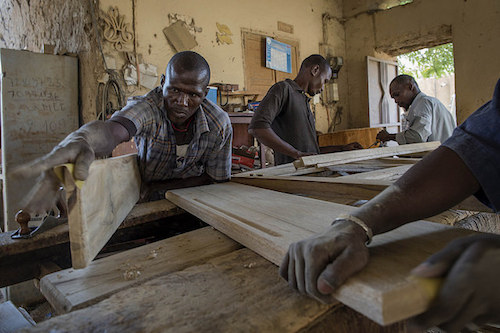
Top image: Employees from different ethnic groups are seen at work at a carpentry in Gao, Mali. Flickr credit.
Note: The following interview was conducted by Ekta Jhaveri, senior research associate for the Healthcare and Financial Sector Development Initiatives at the William Davidson Institute at the University of Michigan. The article originally appeared on NextBillion, which is managed by WDI.
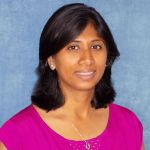
By Ekta Jhaveri
Many small and medium-sized enterprises (SMEs) in developing countries face a classic conundrum when it comes to securing finance. Most constitute the “missing middle,” as they are considered too big for microfinance institutions (MFIs) and too small or risky for traditional finance providers such as commercial banks.
This dilemma is well known, but to truly solve it, we need to know more. To get a deeper understanding of the missing middle SME sector, (which for the purposes of this article we refer to as MM-SME), and how to support it, the Dutch Good Growth Fund (DGGF) commissioned several studies on the entrepreneurial ecosystems of six francophone West African countries – Benin, Ivory Coast, Guinea, Mali, Senegal and Togo. The reports were published as part of DGGF’s #ClosingTheGap series, with research for the country studies conducted by Enclude.
I recently interviewed Julia Kho, knowledge manager at TripleJump, an investment management and advisory services firm that, along with PricewaterhouseCoopers, manages DGGF’s Investment Funds Local SMEs effort.
Ekta Jhaveri: Why was the francophone West African region chosen by DGGF for #ClosingTheGap studies?
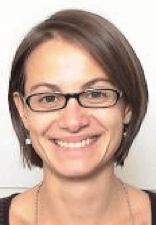
Julia Kho
Julia Kho: The DGGF supports financial intermediaries across the developing world, the mandate covers 68 countries in total. Local financial stakeholders reach out to DGGF for funding support. We received very few proposals from this region. That is why DGGF commissioned these studies to get a better understanding of the SME landscape and the ecosystem around them. The intent was to identify, elaborate on and strengthen existing and potential solutions – including fostering the appetite of investors in investing in local SMEs in the region – to address key challenges and obstacles faced by the missing middle entrepreneurs. Now we see more fund managers addressing this market and expect more activity in the coming years.
EJ: Can you briefly describe the process of entrepreneurial ecosystem assessments?
JK: The entrepreneurial ecosystem assessments were conducted using the ecosystem toolkit created by the Aspen Network of Development Entrepreneurs (ANDE). It involves analyzing the ecosystem along six dimensions or domains – culture, policy, markets, finance, support and human capital. A literature review was followed by field visits to conduct interviews with the stakeholders from the various domains. The fieldwork was followed by a workshop of key stakeholders to discuss findings and possible solutions to close the identified gaps along the six domains.
EJ: How do you characterize or define the missing middle SMEs in francophone West Africa? Were these SMEs homogenous across the six countries?
JK: The starting point of our definition of the MM-SMEs was the one mentioned above. We found that it was important to sub-segment the MM-SME sector in order to get a deeper understanding of the characteristics of local enterprises and their needs and regroup them under clusters that share these common characteristics and needs. The sub-categories we came up with are fairly general and they can be applied across countries; where they differ is around the relative representation of the sub-category by country. So, even though the markets in each of the six francophone West African countries differ, at a high level this sub-segmentation of the SME sector applies. The sub-segments we defined and found were a very large cluster of small necessity entrepreneurs (established for the sake of providing livelihood) followed by moderate growth entrepreneurs (mainly family-owned businesses), and smaller clusters of high-growth startups (young entrepreneurs mainly in the technology sector), opportunity-driven SMEs (entrepreneurs copying successful business models and involved in several businesses) and gazelles (successful startups with high growth rates).
While this sub-segmentation of the SME sector is an important exercise, we are now embarking on a deeper study with the Omidyar Network and DGGF. Its goal is to create a robust segmentation framework of SMEs, which will help investors and intermediaries match appropriate financial products with different enterprise segments, as well as help entrepreneurs understand the most appropriate investors to target.
EJ: Were the challenges more systemic or operational? Can you elaborate on the top three challenges across the six countries?
JK: Both – systemic and operational. While there is some variation across these countries, the few general challenges we saw were:
EJ: Were there any surprising findings from the entrepreneurial assessments you conducted with SME owners? Can you elaborate on a couple of these findings?
JK: I don’t know if these are specific to the region but we found a couple of things that were very interesting if not surprising. First, there is no shortage of dynamic entrepreneurs. The challenge lies in how they look at their business and in understanding their own needs. Entrepreneurs tend to talk about the need for external finance to grow their business. But often when discussing their business further, it appears that the first need is to secure recurring customers to sustain regular revenues and then think about finance, i.e. what type of financial support they need for which purposes. In the region, given the current financial service offerings, we identified that stakeholders are aware of debt products but their exposure to other financial instruments and products is extremely limited and hence their understanding of those, too.
Another finding is related to the varied level of professionalism and sophistication of local businesses. Keeping records of levels of production and supply needs, for instance, and analyzing those to identify what is needed not just to operate tomorrow, next week or next month but rather the next year, is not necessarily a common practice.
EJ: What are the different types of stakeholders (financial and non-financial) that provide support to SMEs? What is the level of collaboration among them?
JK: In addition to what was said earlier on the current financial offers, we identified a gap in financing at the very early stages of development of local enterprises. There are barely any players that can offer external funding (that is not collateralized debt) in the range of 10,000-1 million euros.
On the non-financial side of things, again, in addition to what was said earlier, we see a positive trend of one-stop shops being set up to provide information for local businesses such as how to register, etc. However, besides the few traditional business support development service providers that can be expensive, full-fledged service providers that help entrepreneurs – from the conceptual to commercialization stage – at affordable prices are extremely limited.
As a direct response to this identified gap, DGGF is supporting Suguba, a network of impact hubs that originated in Mali and which are looking to expand to Senegal and Ivory Coast. We are also supporting EtriLabs, a tech innovation hub in Benin and Innov’Up, a women-focused incubator in Togo.
As in many ecosystems, we observe that local stakeholders tend to be disconnected. If the SME sector is not sub-segmented based on characteristics and needs of local enterprises, then the service offering is not targeted and specialized, which makes collaboration challenging. Our work with Omidyar Network (mentioned above) is important as it will provide an understanding of the appropriate financial products based on different enterprise segments.
EJ: A pilot study for the #ClosingTheGap series was done for Kenya in 2015. Are there any learnings from the Kenyan entrepreneurial ecosystem assessment that can be applied to these six countries?
JK: There is no one-size-fits-all approach. There are many variations across the countries and Kenya has an ecosystem that tends to be more dynamic than the six countries we’re discussing. What we learnt was that the sub-segmentation methodology piloted in Kenya was applicable to any other market and that the sub-segments defined through the Kenyan study were also relevant to the francophone West African markets, although the relative proportions of SME sub-segments representation are different. The entrepreneurial culture is promoted in Kenya. There is diversity in terms of ecosystem players: MFIs, banks, mezzanine/venture capital/private equity funds, hubs, incubators and accelerators – and they intervene at different stages of maturity of the enterprises. We saw some linkages with universities (e.g. a hub or incubator hosted by a university). In fact entrepreneurship education is part of some high school/university curricula, which we don’t see in francophone West Africa.
EJ: What other types of innovative financial instruments have the potential to increase access to finance for such SMEs – and which types of financial institutions are best positioned to fill this need?
JK: There are steady moderate growth companies, often family-owned, whose service or product offerings address a market demand but they may still lack the track record, collateral, cash flow or profit levels that can qualify them for a bank loan. These companies require more risky (less collateralized), flexible and long-term capital to grow. This is what we refer to as “mezzanine finance,” which blends elements from traditional private equity and debt financing into a unique product. DGGF commissioned a study in 2016 that dives into this interesting additional offering for missing middle entrepreneurs and seems relevant to local enterprises in the region.
EJ: There is a lot of talk in the development community about the use of blended finance for the missing middle SMEs. What are your thoughts on this?
JK: The concept of blended finance is an interesting one. We see it as particularly relevant to foster innovations, i.e. to test and launch new and different financial products and models. In my mind, local intermediaries – both financial and non-financial ones – would benefit from this type of financial support to try out and identify what works/does not.
All the reports under the #ClosingTheGap series can be accessed on the DGGF website.
Ekta Jhaveri is senior research associate for the Healthcare and Financial Sector Development Initiatives at the William Davidson Institute.